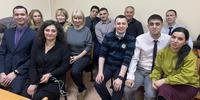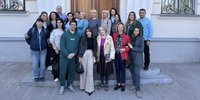The Case of Polosenko and Others in Samara
- #
Senior investigator of the first branch of the investigation department of the FSB of Russia in the Samara region, Captain of Justice I. A. Ivensky initiates a criminal case against Sergey Polosenko, Denis Kuzyanin and Nikolai Vasiliev. The believers are suspected of organizing the activities of an extremist organization (Part 1 of Article 282.2 of the Criminal Code of the Russian Federation).
- #
Mass searches of believers are taking place in Samara. A 23-year-old man reports threats and torture with a heated kettle for refusing to provide security forces with a laptop password.
Polosenko, Kuzyanin and Vasilyev are detained and placed in a temporary detention facility.
- #
The Samara District Court chooses a measure of restraint for believers in the form of detention for a period of 2 months.
- #
Denis Kuzyanin and Sergey Polosenko are transferred to pre-trial detention center No. 1 in the Samara region.
- #
The lawyer visits Nikolay Vasilyev in the temporary detention center. The believer tells the details of his arrest: in order to get into the apartment, the security forces broke down the door, and when they entered, they threatened with firearms and beat Nikolai.
The suspect has a chronic illness and is taking medication on an ongoing basis. The believer submitted an application to the temporary detention facility with a request to conduct a medical examination in order to record the beatings.
- #
The lawyer visits Denis Kuzyanin and Sergey Polosenko in pre-trial detention center No. 1 in the Samara region. Both believers are in quarantine. Denis reports that he notices signs of a cold, as it is cold in the cell, and he has to sleep without a mattress. He does not have a Bible yet, and the believer has not yet received a letter of support.
Sergei Polosenko is kept in a three-bed cell, where there are four prisoners, so he sleeps on the table. He has the necessary medicines as well as a Bible.
Sergey Polosenko is charged with committing a crime under Part 1 of Article 282.2 of the Criminal Code of the Russian Federation.
- #
Investigator Ivensky initiates a criminal case against Aram Danielyan, the father of a six-month-old baby. The believer is suspected of committing a crime under Part 1 of Article 282.2 of the Criminal Code of the Russian Federation. The criminal case is merged into one proceeding with the case of Polosenko et al.
According to investigators, the believers resumed the activities of the "Administrative Center of Jehovah's Witnesses in Russia" in the Samara region from December 2020 to December 2021.
Around midnight, law enforcement officers detained Danielyan at the Samara airport. During a personal search, his passport, mobile phone and air ticket were seized from him (the believer planned to visit his homeland - Armenia).
- #
Despite the fact that Danielyan has a permanent place of residence, a family and a small child, investigator Ivensky insists on the detention of the believer. He believes that Aram Danielyan can hide from the investigation or destroy material evidence if a milder measure of restraint is chosen.
The Samara District Court chooses a measure of restraint for Danielyan in the form of detention until February 14, 2022. He is placed in a temporary detention facility.
- #
It becomes known that Nikolay Vasilyev was transferred to pre-trial detention center No. 1 in the Samara region.
- #
It becomes known that Nikolai Vasiliev was hospitalized with a serious illness. Soon he should be transported back to the pre-trial detention center, where he will be placed in the infirmary.
- #
After about 300 days of imprisonment, the four believers are released under a ban on certain activities until February 14, 2023. To track their movements, electronic bracelets are put on their feet.
At the exit from the courthouse, Aram, Denis, Sergey and Nikolay are greeted with applause by a support group of 30 people. Believers do not complain about their state of health.
- #
The case against 4 believers is submitted to the Samara District Court of Samara. It will be considered by judge Dmitry Derunov.
- #
The prosecutor reads out the indictment. The defendants express their disagreement.
Aram Danielyan says that it is important for him as a Christian to worship God with others, including praying and singing songs, and that this is his constitutional right.
Sergei Polosenko states that the investigation did not bring any of his specific statements testifying to the manifestation of extremism. He states that the mention of the name Jehovah does not in itself indicate that a person or group of people belongs to any legal entity.
- #
A prosecution witness, FSB operative N. A. Kulik, who participated in the search of the Polosenko family, is being interrogated.
The witness says that, in his opinion, the defendants took too long to familiarize themselves with the case file. To some of the lawyers' questions, Kulik answers "I don't know", "I don't remember", or says that the information is available in the case file.
Aram Danielyan, Denis Kuzyanin and Nikolay Vasilyev refuse the services of lawyers. Danielyan submits a petition for his wife's participation in the defense.
- #
The court satisfies the petition of Sergey Polosenko to refuse a lawyer under the agreement.
Denis Kuzyanin asks the court to change the measure of restraint so that he has the opportunity to go to work in a neighboring city. The court refuses.
- #
The court is interrogating the witness Kharitonov, who attended services of Jehovah's Witnesses until 2017. He replies that his conversations with the defendants were only about studying the Bible and "were not of a propagandistic nature." The prosecutor asks the court to read out Kharitonov's initial testimony.
Another witness, Yeganyan, who has repeatedly spoken aggressively about Jehovah's Witnesses, says he only knows Denis Kuzyanin. After the interrogation, Yeganyan, addressing the defendants, threatens "to imprison more believers in the near future."
At the same time, both witnesses confirm that they did not hear calls from the defendants to overthrow the constitutional order of the Russian Federation and did not see manifestations of extremism towards others.
- #
The court examines the materials of the case. The prosecutor reads out the documents of 2014 relating to the legal entity of Jehovah's Witnesses, and the examination of their literature, made in 2009. The latter recognizes that Jehovah's Witnesses are always loyal and obedient to the authorities and are tolerant of representatives of other religions.
- #
Witnesses are being questioned. One of them studied the Bible with Aram Danielyan via video link and secretly recorded their conversations. The witness describes him as a good speaker and a talented teacher. He knows Aram and the other defendants only online, and he has not heard any calls for illegal actions.
- #
A girl who was a former Jehovah's Witness is being interrogated. She did not hear any calls from the defendants for illegal activities, refusal to perform civil duties, as well as incitement to violence and the overthrow of the state system. The witness attended the services voluntarily, they were educational in nature, the Bible was discussed. The girl is surprised that the legal entities of Jehovah's Witnesses are recognized as extremist, because "these are peaceful people who live according to the Bible and do nothing wrong."
The judge extends the defendants' preventive measure until January 20, 2024.
- #
The prosecutor voices in detail the religious documents of the local community of Jehovah's Witnesses, as well as lists of believers and their correspondence in messengers.
- #
According to the videoconferencing, the compilers of the religious examination Galiulin R. R. and Galiev L. M. It turns out that the examination was paid for by the FSB. The judge removes the question regarding the religion of the experts.
- #
The prosecutor finishes the announcement of the last volumes of the case (28-35). The court examines material evidence, including Bibles, seized during the search. Nikolay Vasilyev notes that the investigation did not provide evidence that the seized literature is included in the Federal List of Extremist Materials.
- #
On the part of the defense, two employees of Aram Danielyan and his relative are being interrogated. They know the defendant as an honest, sympathetic and law-abiding citizen, without bad habits. He never participated in the discussion of political issues, did not incite anyone to hatred and enmity, they did not hear extremist statements from him.
The defendants draw the court's attention to the conclusion of a comprehensive psychological and religious examination. It emphasizes that believers are a religious group, and their meetings are informal. The form of addressing the participants to each other by name, as well as the use of the words "brother" and "sister" indicates that they are equal to each other, there are no divisions by position.
According to the conclusion of the examination, the words of believers do not contain propaganda of the inferiority of citizens on a national or social basis, motives to break off family relations or to carry out extremist activities.
Sergei Polosenko states that the bank cards and personal records presented in the case file do not prove in any way that he was engaged in extremist activities: "Rather, their presence suggests that I live in society, I have a business reputation."
- #
A motion has been filed to attach positive characteristics to the defendants.
Defense witnesses are interrogated - acquaintances and relatives of the accused. Five of them, who are not Jehovah's Witnesses, state that the difference in religions has never caused disagreement or controversy between them and the defendants.
Denis Kuzyanin tells the court that during the search, two new folders appeared in the memory of the laptop seized from him, which contain information included in the indictment of the case file.
Judge Dmitry Derunov instructs the secretary to summon for questioning the persons who were present during the search of Kuzyanin's house.
- #
The FSB task force that searched Denis Kuzyanin's house is being interrogated. As it turned out, the instruction to the technician to create new folders on the desktop of the believer's laptop and add documents there during the search was given by the detective. The investigator did not reflect these actions in the protocol.
- #
The defendants comment on the materials of the case with the decision of the ECHR regarding Jehovah's Witnesses in Russia and conclude: "The assertion by the consequence that the proclamation of one's religion as the only true one is regarded as incitement to religious hatred, entailing socially dangerous consequences, is a kind of speculation of the investigator ... Neither the examination of the evidence by the prosecution, nor the testimony of witnesses, nor the examination proved the fact confirming that the defendants incited religious hatred or proclaimed violence on any grounds.
For an hour, the court watches a video recording in which Aram Danielyan discusses Bible teachings with a man.
- #
Audio recordings of the worship service in which the defendants participated are listened to.
- #
The Court continues to listen to audio recordings of worship services, in particular a report on "Put on Love", which speaks of the importance of forgiveness and conflict resolution.
- #
The final statement of the defendant Aram Danielyan in Samara The final statement of the defendant Denis Kuzyanin in Samara The final statement of the defendant Nikolay Vasiliev in Samara The final statement of the defendant Sergey Polosenko in Samara - #
Aram Danielyan, Denis Kuzyanin, Sergey Polosenko and Nikolay Vasilyev are in SIZO-1 in Samara. They can write letters.
- #
Sergey Polosenko and Nikolay Vasilyev are transferred to Togliatti pre-trial detention center No. 4. They can write letters.
- #
Nikolay Vasilyev and Sergey Polosenko are still in the Togliatti pre-trial detention center awaiting an appeal. Vasilyev is being held in a two-bed cell, and Polosenko is being held in a four-bed cell. Believers regularly receive parcels from loved ones, but for some unknown reason they have not yet received letters. Relations with the administration of the pre-trial detention center and cellmates are normal.
After the verdict, Polosenko had several visits with his wife and other relatives. Vasiliev has the opportunity to regularly take medications necessary for his chronic illness.
- #
- #
It becomes known that Sergey Polosenko and Nikolai Vasilyev left the pre-trial detention center and are in the process of moving to a place of serving their sentence.
- #
It becomes known that Nikolay Vasilyev and Sergey Polosenko were taken to correctional colony No. 12 in Mordovia to serve their sentences for their faith.
All four believers are in Mordovian penal colony No. 12, where they will serve their sentences for their faith.
- #
Nikolai's living conditions are tolerable, but it can be difficult for him to call his relatives, as in the evenings there is a large queue at the phone. Vasiliev tries to maintain a positive attitude and supports emotional health with the right daily regimen. The believer is waiting to receive the necessary medicines. In his spare time, he teaches English to several prisoners. He has a Bible. Letters arrive regularly.
- #
Denis Kuzyanin is kept in a two-story barracks, in which there are about 80 other people. The conditions of detention are satisfactory. The believer's relations with the administration and prisoners are normal.
Denis does not lose heart. He has the opportunity to read a library copy of the Bible. Letters also serve as a source of support.
- #
The Sixth Court of Cassation of General Jurisdiction in Samara upholds the harsh sentence of four Jehovah's Witnesses — 7 years in a general regime colony.
In the cassation appeal, the believers' lawyer drew attention to the fact that the verdict and the appeal ruling were issued with violations, "the boundaries of the accusation are blurred... and create confusion in establishing the facts of the case." The lawyer stressed that "the courts have criminalized the practice of worship of Jehovah's Witnesses and their beliefs." According to him, "even in atheistic times in the Soviet Union, when Jehovah's Witnesses were persecuted, believers were not always sentenced to imprisonment." The Court of Cassation ignored these and other arguments of the defense.
- #
In the colony, where four believers are held, there are serious problems with medical care. Nikolay Vasilyev is not yet receiving the necessary treatment due to a chronic illness.
The basic living needs of prisoners are met. They regularly receive parcels and letters, and there is an opportunity to buy food in the colony's store.
- #
Danielyan, and a few days later Polosenko and Kuzyanin, were placed in a punishment cell. Aram was reprimanded for bringing a book to his workplace to pass the time — there are no orders at the sewing factory where he works.







